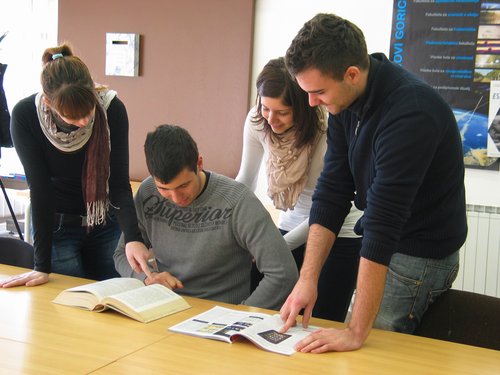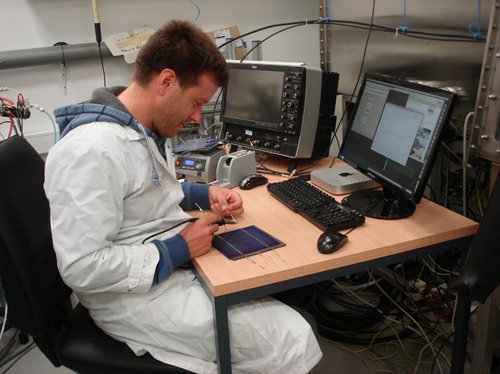Bachelor’s degree programme Engineering and Management (first cycle)
| Study programme: | Bachelor's degree programme Engineering and Management (first cycle) |
|---|---|
| Main fields of study: | Engineering and Management |
| Programme code: | 1GI |
| Programme cycle: | First cycle professional degree |
| Name of the qualification: | Diploma |
| Qualification title: | diplomirani gospodarski inženir (VS) (equivalent to Bachelor of Applied Science in Engineering and Management) |
| Qualification abbreviation: | dipl.gosp.inž. (VS) (equivalent to B.A.Sc. in Engineering and Management) |
| Final examination: | no |
| Dean: | prof. dr. Imre Cikajlo |
| Programme director: | prof. dr. Imre Cikajlo |
Programme description
The full time course comprises of lectures, practical work sessions, an industrial placement, and a final Diploma thesis. The programme lasts 6 semesters and focuses on general fileds of study in the first three semesters, while specialised subjects are covered in the next three semesters. Teaching language is Slovene. Industrial placement in one of the local companies is 12 weeks long and takes place in the fifth semester.
An obligatory course and an Fundamentals of Entrepreneurial Planning course in the third year assume that students master key topics from the first two years which are interdisciplinary connected in these two subjects.
In the diploma thesis, students typically continue with the project they carried out during their industrial placement. This allows for more thorough problem solving connected with a concrete working environment.
Curriculum of the bachelor's degree programme Engineering and Management
Admission requirements
Completion of a four-year secondary education programme and a matura examination, a vocational matura examination or final examination. In case of limited admission, the selection criteria comprise the candidate's final grade at the matura or final examination (60% points) and his/her overall achievement in the 3rd and 4th year (40% points).
Educational and professional goals
A graduate in Engineering and Management is able to provide solutions for managing, engineering and economic problems in a company.
Areas of work include:
- management of technological and business systems;
- management of industrial production processes;
- planning, managing and assessing investment projects;
- planning strategic and operational develoment;
- marketing of engineering services and industrial products;
- development of technological processes; management of computer aided systems.
Access to further studies
Graduates can enter undergraduate programmes of the university type, post-graduate programmes leading to specialization, and other post-graduate programmes, according to the recommendations issued by the respective institution of higher education in the pre-enrolment announcement for undergraduate and post-graduate study programmes.
At the School of Engineering and Management we offer a Master's programme in Engineering and Management, prepared in alignement with recommendations of the Bologna declaration.
Assessment
The forms of checking and evaluating knowledge in individual courses are as follows: written exams, oral exams, colloquiums and seminar assignments. Successful completion of assignments from exercises and seminar assignments is a condition for taking the exam. As part of the practical training, the student prepares an interim and final report, which he orally defends.
Diploma thesis
Special emphasis is placed on the diploma thesis, which is an independent professional work through which the graduate proves that he or she systematically uses the acquired knowledge to solve challenging tasks in the field of engineering and management. In the thesis, the student investigates and solves a specific task, and the topic of the thesis is approved in advance by the school senate based on a written proposal. This determines the mentor and the committee for the evaluation of the thesis. The student completes his studies with a public defense of his thesis before a three-member committee.
Courses refresh
1. year
| Compulsory courses | Hours | ECTS |
|---|---|---|
| Basics of information and communication technologies | 100 | 4 |
| Business Mathematics (n) | 100 | 4 |
| Digital resource & document management | 100 | 4 |
| Economics and Organization of the Enterprise (n) | 250 | 10 |
| Electrical Engineering (n) | 175 | 7 |
| Engineering Chemistry | 175 | 7 |
| Marketing strategies, web and new media | 175 | 7 |
| Technical Mathematics | 175 | 7 |
| Technical Physics | 250 | 10 |
2. year
| Compulsory courses | Hours | ECTS |
|---|---|---|
| Accountancy and Business Finances | 150 | 6 |
| Business information systems | 175 | 7 |
| Contract law and law of intellectual property | 125 | 5 |
| Introduction to Control Systems | 250 | 10 |
| Manufacturing systems | 150 | 6 |
| Power Engineering and Environment | 150 | 6 |
| Statistics | 75 | 3 |
| Web Technologies | 125 | 5 |
| General elective courses | Hours | ECTS |
| English | 150 | 6 |
| Fundamentals of Entrepreneurial Planning | 150 | 6 |
| Human Resource Management | 150 | 6 |
| Logistics | 150 | 6 |
| Sociology of Organization and Business Communication | 150 | 6 |
| Technical elective courses | Hours | ECTS |
| Computer aided design | 150 | 6 |
| Computer programming | 150 | 6 |
| Information security | 150 | 6 |
| Mobile Technologies | 150 | 6 |
3. year
| Compulsory courses | Hours | ECTS |
|---|---|---|
| Diploma Thesis | - | 6 |
| Electronic Business | 150 | 6 |
| Methods of System Engineering | 150 | 6 |
| Practical placement | 480 | 24 |
| Project Management | 150 | 6 |
| General elective courses | Hours | ECTS |
| English | 150 | 6 |
| Fundamentals of Entrepreneurial Planning | 150 | 6 |
| Human Resource Management | 150 | 6 |
| Logistics | 150 | 6 |
| Sociology of Organization and Business Communication | 150 | 6 |
| Technical elective courses | Hours | ECTS |
| Computer aided design | 150 | 6 |
| Computer programming | 150 | 6 |
| Information security | 150 | 6 |
| Mobile Technologies | 150 | 6 |



